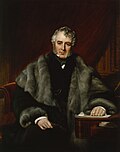History
English monarchs have had secretaries and clerks since at least the late Middle Ages, under various titles such as King's Clerk, King's Secretary, or Principal Secretary. This office turned into the Secretary of State, and eventually became a governmental position. The Scottish monarchy had a similar office, the Secretary of Scotland.
Colonel Herbert Taylor, who was appointed in 1805, is acknowledged as the first private secretary to the sovereign. However, the office was not formally established until 1867. Constitutionally, there was some opposition on the part of ministers to the creation of an office that might grow to have considerable influence upon the sovereign. However, it was soon realised that the sovereign was in need of secretarial support, since his or her ministers had ceased to provide daily advice and support with the growth of ministerial government. Queen Victoria did not have a private secretary until she appointed General Charles Grey to the office in 1861; her husband Prince Albert had in effect been her secretary until his death.
Functions
The principal functions of the office are:
- to act as a channel of communication between the sovereign and his or her governments, and to advise the sovereign on constitutional, political or governmental questions;
- to organise the official programme of the sovereign, and to ensure its acceptability to both the sovereign and the government; these duties including drafting speeches, maintaining connection with other households, the Royal Train, The King's Helicopter, No. 32 (The Royal) Squadron RAF, and the armed forces – the last through the Defence Services Secretary; and
- to deal with the sovereign's official correspondence (including congratulatory messages), from members of the public, Royal Communications, and the Court Circular; and also to deal with the sovereign's private papers, the Royal Archives, and the monarchy's official website.
The position of private secretary is regarded as equivalent to that of the permanent secretary of a government department. The incumbent is always made a privy counsellor on appointment, and has customarily received a peerage upon retirement (a life peerage since 1972, although a small number have been given hereditary titles). Until 1965, peerages granted to Private Secretaries were hereditary baronies, with the exception of Lord Knollys, who was created a viscount in 1911. All private secretaries since the time of Lord Stamfordham have been created peers, with the exceptions of Sir Alexander Hardinge (inherited his father's barony in 1944), Sir Alan Lascelles (declined as he felt titles to be a show of self-importance) and Sir William Heseltine (who is an Australian).
Private secretaries to the sovereign are always knighted, typically in the Order of the Bath or the Royal Victorian Order, or both. The same is often true for principal private secretaries to other members of the Royal Household, such as William, Prince of Wales.
The private secretary is head of only one of the several operational divisions of the Royal Household. However, he or she is involved in co-ordination between various parts of the household, and has direct control over royal communications, the Royal Archives, and the office of the Defence Services Secretary.
There are 57 people employed in the office of the monarch's private secretary. [1]
This page is based on this
Wikipedia article Text is available under the
CC BY-SA 4.0 license; additional terms may apply.
Images, videos and audio are available under their respective licenses.

























